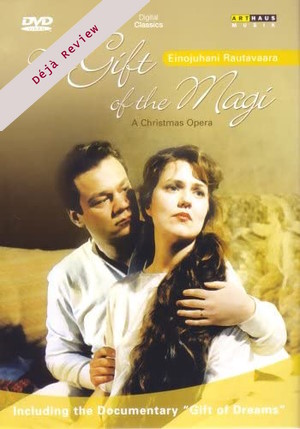
Déjà Review: this review was first published in November 2005 and the disc is still available. Please note that the composer has passed away since the review was published.
Einojuhani Rautavaara (1928-2016)
The Gift of the Magi (1993-1994)
Pia Freund (soprano) – Minna; Jaako Kortegangas (baritone) – Joel; Martti Wallén (bass) – Mr. Salomon; Anna-Lisa Jakobson (mezzo soprano) – Queen of Sheba; Lassi Virtanen (tenor) – Zoff Musonoff
Veräjäpelto Choir
Tapiola Sinfonietta/Petri Sakari
Directed by Hannu Heikinheimo.
Extra: The Gift of Dreams, directed by Aarno Cronvall.
Arthaus Musik 100419 DVD [98]
Rautavaara is perhaps still best known for his orchestral works – especially his Symphony No 7 (Angel of Light) and the Cantus Arcticus. But he has also had a lengthy career as a composer of opera. Kaivos (The Mine) was written in 1963; later operas have included Thomas (1984), Vincent (1987), Aleksis Kivi (1996) and Rasputin (2003). The Gift of the Magi is relatively slight compared to some of these. It has – as usual for Rautavaara – a libretto by the composer himself. It is based on O. Henry’s well-known short story of the same title, first published in 1906.
O. Henry’s story is of a pair of impoverished newlyweds, Jim and Della. As Christmas approaches, Della wants to buy her husband a Christmas present, but has no money. She decides that she will sell her long hair (which her husband adores) to a wig-maker, and use the proceeds to buy a chain fit for her husband’s gold watch, a family heirloom and the only thing of value that they possess. She does so. But she then discovers, when she comes to give him the chain, that he has sold the watch – so as to buy her fine combs for the long hair she no longer has! Henry concludes thus: “Here I have lamely related to you the uneventful chronicle of two foolish children in a flat who most unwisely sacrificed for each other the greatest treasures of their house. But in a last word to the wise of these days let it be said that of all who give gifts these two were the wisest. Of all who give and receive gifts these two were the wisest. Of all who give and receive gifts, such as they are wisest. Everywhere they are wisest. They are the magi.”
Rautavaara transposes the action to a run-down area of Helsinki in the 1920s; Jim and Della become Joel and Minna. Where O. Henry’s story concentrates on the wife’s thoughts and actions, leaving until the end the revelation of what her husband has done, Rautavaara shows us the pair acting in parallel, but each in ignorance of the other’s actions. What are mere allusions in Henry’s text – mentions of King Solomon and the Queen of Sheba – are turned into actual characters in the opera: Mr. Salomon, the landlord and the Queen of Sheba, “a woman of easy virtue”.
This TV production is atmospherically directed, with snow-bound exteriors and spare interiors. Spoken dialogue is well used, always with an orchestral background. The ambiguities of love and the nature of sacrifice are both themes with a predictable appeal for Rautavaara. Words which the wigmaker sings – I am quoting from the onscreen subtitles – go to the heart of the opera: “Is there anything more noble and destructive than love, the extravagance of love”. The ending is beautifully realised – dismay turning to the mutual realisation and renewal of love and to that love’s effects on the pair’s neighbours. Pia Freund is a particularly tender Minna, Jaako Kortegangas a powerful and undemonstrative Joel. Lassi Virtanen sings his one set-piece particularly well. This is a chamber opera well-conceived and well-performed.
It is accompanied on this DVD by a documentary on Rautavaara. We have footage of the composer at the piano; the composer – who mostly speaks in English throughout – talking of childhood memories of a visit to an island monastery; of the inspiration of icons and of his reading of Rilke. It is full of interesting observations by Rautavaara, such as “serialism taught me the necessity of structure” and “when composing, I use the piano, because you often accidentally press a wrong key. These slips are important, because you can follow them and they can lead to new phenomenon, a new path in the music you are composing”. There are contributions from, amongst others, Olli Mustonen and Markus Lehtinen. A particularly interesting sequence presents Rautavaara and Vladimir Ashkenazy in conversation about the piano concerto Ashkenazy commissioned from Rautavaara. “All good music is romantic” says Rautavaara. “Poetic”, replies Ashkenazy.
All in all The Gift of Dreams – the title comes, as Rautavaara himself explains, from Baudelaire – is an interesting, if not especially revelatory introduction to Rautavaara. There is relatively little music to be heard, and it is hard to imagine anyone watching it very often. The Gift of the Magi would be a much better reason for purchase – in a more civilised world it would be part of our Christmas TV schedules.
Glyn Pursglove
Help us financially by purchasing from




















